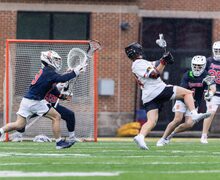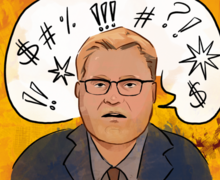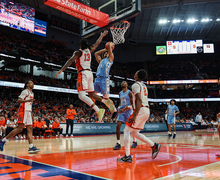To the highest bidder: From the streets to computer screens, ticket scalping adapts to digital age
Pulp
Chase Gaewski | Asst. Photo Editor
Although many people frequently associate ticket scalping with the individual seen by the Carrier Dome or Marshall Street, more students are finding options to sell tickets online. Students utilized Facebook to scalp for the Common Ground for Peace events.
The men stride up and down Marshall Street, arms outstretched and tickets fanned in their hands. It’s a rapid route they pace as cars stream into campus, the congregation of fans that’s rhythmically magnetic on a Syracuse game night.
The men know their paths, moving along the streets and looking from side to side, alert for any approaching fans that have joined the crowds at the last minute.
“Tickets,” they call out to people decked out in orange. “I’ve got tickets!”
Perhaps this is the traditional image of ticket scalping at the university, the people who wave tickets to Syracuse fans. They focus on adults, hardly speaking to the crowds of students as they pass up and down the street.
That may be because students themselves are choosing a different route to buy and sell their tickets.
Log on to Facebook and search through its groups: Syracuse University Class of 2013, 2014, 2015 and 2016. Each is steeped with thousands of members, and nearly all of them are SU students.
Some ask questions about class, such as who’s in AST 101: “Our Corner of the Universe” and understands this part of the lab assigned? Others promote their campus organizations and events with suggestions, like if you’re interested in intramural soccer, how about attending Thursday’s general interest meeting?
But the vast majority of these Facebook interactions revolve around tickets. Buying, selling, looking, competing: Tickets are everywhere. From SU football and basketball games to the One World Concert featuring performances by multiple well-known musicians and a talk by the Dalai Lama, students use Facebook as a means of buying and selling seats for events.
One reason for students taking this route is the quick interactions available on social media.
Lindsay Dolak, a junior magazine major, heard about a sold-out Dada Life concert at the Westcott Theater last Tuesday and spontaneously decided to go. Dolak immediately headed to Facebook to look for a pair of tickets.
“You can cast your net to a much bigger group of people,” Dolak said, referring to Facebook group usage. “It’s really convenient to be able to ask so many people (about tickets) at once.”
Colleen Koroma, a sophomore accounting major, recently sold tickets for the One World Concert, though at a loss. She agrees that social networking sites are convenient for ticket resale, also because of their immediate accessibility.
“It’s on the go,” Koroma said.
With websites such as Facebook, students can be notified by new group posts, see tickets available and immediately contact a seller. And with the proximity of all students on campus, Koroma said, it’s easy to meet up to trade off tickets and payment.
However, problems of ticket resale also reach the niche of social media. Often mark-ups and scalping occur.
Jordan Feldman, a freshman education major, marked up his tickets systematically. He bought his Syracuse football ticket for $20, but sold it to a student over Facebook for her father. He charged the face value for an adult, which is $45.
“I thought that was a fair way of doing it,” he said.
In the state of New York, selling tickets for a price that exceeds face value is illegal. It is classified as ticket solicitation. While statutes are in place to protect ordinary consumers who resell their tickets equal to or below the face price, a person or corporation must own a license to sell tickets above their purchase price.
Breaking the statutes regarding ticket solicitation, however, is merely a legal violation. At its maximum, punishment for reselling four or fewer tickets for more than their face value is a fine of $500.
“A violation, by definition, is not a crime,” said Professor Todd Berger of the SU College of Law and director of the Criminal Defense Clinic. Though it is illegal, he believes that ticket scalping is low on the list of priorities for law enforcement.
Despite legal issues, many students believe that ticket mark-ups among students on Facebook are fair.
Francis Sirois, a freshman broadcast and digital journalism major, said he doesn’t have much money to spend on marked-up tickets, but he agrees with the system.
“If you weren’t organized enough to buy them when they were cheaper, the longer you wait, the more expensive things get,” he said.
To some, ticket scalping in the digital realm is a natural part of economics. Peter Katz, a graduate student in the English and textual studies department, studies Marxist writings and believes they can explain ticket mark-ups. Ticket scalping is the logical conclusion of capitalism: to acquire goods by any means and then sell those goods in order to acquire capital.
Students agree with this system, even on Facebook.
“I think that’s how the world of commerce works. People are smart, and if they know that (other) people want something, they’ll raise the price on it,” said Dolak.
Michaella Vagelatos, a sophomore communication and rhetorical studies major, believes that ticket prices depend not simply on face value, mark-ups, convenience or economics via social media, but on the individual buyer.
Said Vagelatos: “If you’re going to spend extra, it has to be worth it to you.”
Published on October 9, 2012 at 2:59 am
Contact Gabriela: ggriccar@syr.edu





